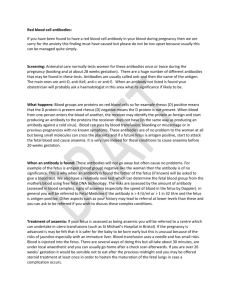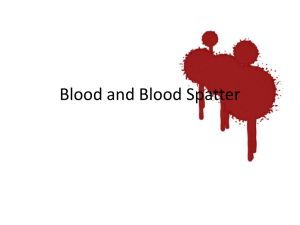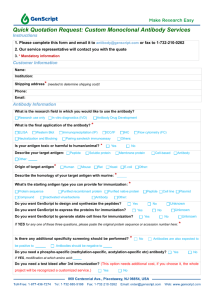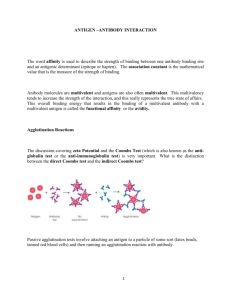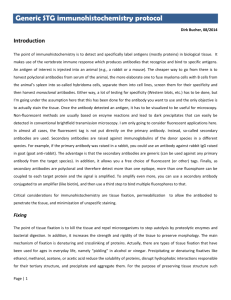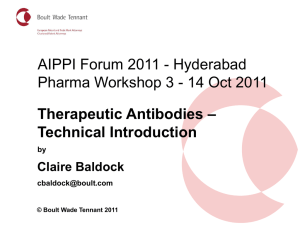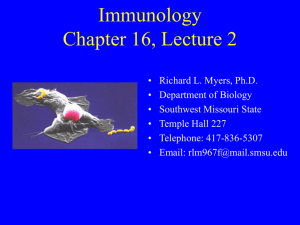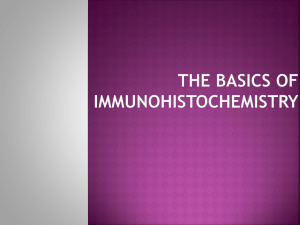International Working Group on Antibody Validation (IWGAV)
advertisement
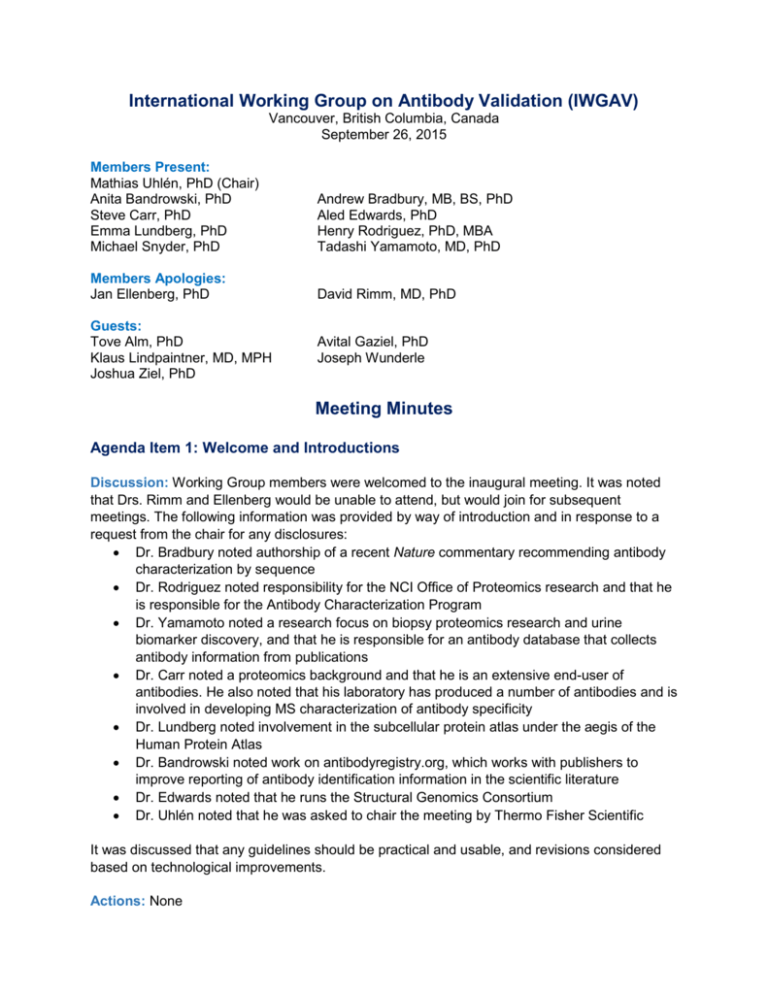
International Working Group on Antibody Validation (IWGAV) Vancouver, British Columbia, Canada September 26, 2015 Members Present: Mathias Uhlén, PhD (Chair) Anita Bandrowski, PhD Steve Carr, PhD Emma Lundberg, PhD Michael Snyder, PhD Andrew Bradbury, MB, BS, PhD Aled Edwards, PhD Henry Rodriguez, PhD, MBA Tadashi Yamamoto, MD, PhD Members Apologies: Jan Ellenberg, PhD David Rimm, MD, PhD Guests: Tove Alm, PhD Klaus Lindpaintner, MD, MPH Joshua Ziel, PhD Avital Gaziel, PhD Joseph Wunderle Meeting Minutes Agenda Item 1: Welcome and Introductions Discussion: Working Group members were welcomed to the inaugural meeting. It was noted that Drs. Rimm and Ellenberg would be unable to attend, but would join for subsequent meetings. The following information was provided by way of introduction and in response to a request from the chair for any disclosures: Dr. Bradbury noted authorship of a recent Nature commentary recommending antibody characterization by sequence Dr. Rodriguez noted responsibility for the NCI Office of Proteomics research and that he is responsible for the Antibody Characterization Program Dr. Yamamoto noted a research focus on biopsy proteomics research and urine biomarker discovery, and that he is responsible for an antibody database that collects antibody information from publications Dr. Carr noted a proteomics background and that he is an extensive end-user of antibodies. He also noted that his laboratory has produced a number of antibodies and is involved in developing MS characterization of antibody specificity Dr. Lundberg noted involvement in the subcellular protein atlas under the aegis of the Human Protein Atlas Dr. Bandrowski noted work on antibodyregistry.org, which works with publishers to improve reporting of antibody identification information in the scientific literature Dr. Edwards noted that he runs the Structural Genomics Consortium Dr. Uhlén noted that he was asked to chair the meeting by Thermo Fisher Scientific It was discussed that any guidelines should be practical and usable, and revisions considered based on technological improvements. Actions: None Agenda Item 2: Welcome on Behalf of Thermo Fisher Scientific Discussion: Dr. Lindpaintner thanked the Working Group members on behalf of Thermo Fisher Scientific and expressed hope for clear antibody validation guidelines for both the scientific community and antibody producers. The Working Group will develop guidelines independently, with Thermo Fisher providing operational support. Phase Five Communications has been retained to provide logistical, writing, and literature research assistance to the Working Group. Actions: None Agenda Item 3: Vision, Mission, and Process for the Working Group Discussion: The Working Group will develop guidelines for antibody producers and end users. Guidelines will contemplate validation of antibody specificity, which will encompass functionality in specific assays. Guidelines will also provide recommendations for ensuring reproducibility, which includes both revalidation recommendations for antibody producers and reporting guidelines for publication. Guidelines for specificity will need to be defined for each intended application and should include recommendations for ensuring an antibody recognizes the correct target, as well as defining cross-reactivity. For guideline development, quantitative standards are preferred, although specific challenges to this goal exist, including the fact that antibody concentration is often unknown. Quantitative guidelines are also not practical for polyclonal antibodies, which are widely used in research, and are an essential resource for applications such as chromatin immunoprecipitation (ChIP). Defining antibodies by sequence could facilitate reproducibility, particularly in terms of reporting antibody data; however, this approach would not be feasible for polyclonal antibodies. Defining antibodies by sequence may be included as a recommendation for the future. There is also interest in involving publishers and funders in this initiative. Adoption of prospective guidelines by funders (eg, Wellcome Trust, NIH, etc) and publishers would ensure uptake by the scientific community. Guidelines will be developed over the course of 2015-2016, with release at HUPO 2016 as a goal. Actions: It was recommended that the Working Group establish a wiki site that contains meeting materials, summaries, and draft recommendations Agenda Item 4: Discussion of Other Standardization Initiatives Discussion: Several ongoing standardization initiatives were of interest to the Working Group and include the Resource Identification Initiative, the NCI Antibody Characterization Program, the Global Biological Standards Institute (GBSI) Antibodies Validation Initiative, and the Affinity Binder Knockdown Initiative. Dr. Bandrowski presented information regarding the Resource Identification Initiative, which was launched to develop a standardized format for reporting the use of research resources, such as model organisms, software tools/databases, and antibodies. Research Resource Identifiers (RRIDs), when used by authors, significantly improved resource identification for antibodies, organisms, and software tools. At present (September 2015), RRIDs have been included in more than 500 publications, across 60 journals, with enforcement policed by journal editors. Cell Press has recently adopted RRID use for publication Dr. Rodriguez discussed the NCI Antibody Characterization Program, which was established in 2008, with antigens provided by investigators and monoclonal antibodies produced in mice or rabbits. Over 4500 clones have been examined, leading to the selection of more than 331 antibodies with full characterization. Based on end-use priorities, selected antibodies are extensively characterized by ELISA, western blot, IHC, IP-MS, SPR, NCI-60 protein arrays, or NAPPA assays. Characterized antibodies and SOPs are made available to the research community (dual-distribution channel) Dr. Bradbury discussed the GBSI Antibodies Validation Initiative: In 2014, the GBSI established a task force of volunteers to address issues caused by widespread use of mischaracterized, misidentified, or contaminated polyclonal and monoclonal reagents. The objective of the task force is to “advance the quality, reproducibility, and translation of antibodies used in basic and preclinical research and development.” The task force has implemented a survey to identify the challenges and opportunities regarding best practices for antibody use. A follow-up meeting is planned for Autumn 2016 Dr. Alm presented information on the Affinity Binder Knockdown Initiative, which is a public-private partnership between the research community and life science companies. This initiative relies on crowdsourcing, whereby antibody users provide validation data for antibodies in exchange for credits with antibody suppliers. To submit data, users are asked to provide details of the antibody used, the silencing reagent employed, and an experimental protocol. Image and experimental details showing minimum knockdown of 50% of the target protein in specific applications may be included; only positive results (successful validation) are included. Currently, Atlas Antibodies and Novus Biologicals have agreed to provide credits for user validation Actions: None Agenda Item 5: Context-Dependent Performance of Antibodies Discussion: Dr. Lundberg presented data gathered through initiatives of the subcellular protein atlas, examining the co-localization of antibody binding signal with green fluorescent protein (GFP)-tagged proteins, expressed from bacterial artificial chromosomes (BACs) In the analysis of 300 antibodies predicted to recognize antigens expressed by 180 transgenes, 48% of antibodies produced binding signal that overlapped with GFP to some extent For the 48% of antibodies that produced overlapping binding signal, co-localization was perfect in only 36% of cases A key conclusion is that co-localization with BAC-derived GFP-tagged protein is imperfect as an antibody validation approach; additional tests, including genetic validation by knockout or knockdown, should be considered Actions: None Agenda Item 6: Epitope Mapping—Lessons Learned Discussion: Dr. Uhlén presented data gathered under the aegis of the Human Protein Atlas, in which the contribution of linear and conformational epitopes to antibody binding specificity was examined using peptide and protein arrays. Peptide arrays consisted of 3 million peptides covering the whole human proteome. Protein arrays contained protein fragments of approximately 100 amino acids containing the defined epitope. Key conclusions included: A majority of the epitopes are linear The epitopes involve relatively few amino acids (3-7) Linear epitopes are “conformational” (gives specificity) Sample preparation (degree of denaturation of proteins) will significantly influence the performance of the antibody ‒ Different applications normally treat the sample in very different ways Group discussion noted that binding data produced by this approach are qualitative rather than quantitative and, therefore, the approach is limited as a component of validation guidelines. Actions: None Agenda Item 7: Deliverables for the Working Group Discussion: The Working Group will develop validation guidelines for antibody producers and users, with components covering antibody specificity and reproducibility. The guidelines for specificity will encompass functionality in specific assays. Recommendations for reproducibility will include revalidation guidelines for antibody producers, as well as reporting recommendations for users. Actions: None Agenda Item 8: Validating Antibodies in Specific Applications Discussion: The Working Group will develop guidelines for validating antibody specificity for end-user applications, including: Western blotting (WB) Immunohistochemistry (IHC) Immunocytochemisty/immunofluorescence (ICC/IF) Immunoprecipitation (IP) Chromatin immunoprecipitation (ChIP) Sandwich assays (ELISA) Protein arrays Flow cytometry (FC) Reverse phase protein assays (RPPA) For most applications, a genetic approach is the preferred method for validating antibody specificity. Genetic approaches include traditional gene targeting, CRISPR/Cas9-based gene disruption, or knockdown by siRNA (or another appropriate technology). Disruption of the gene encoding the intended target should eliminate signal relative to reference, or control, samples; knockdown should reduce antibody labeling by at least 50%. Other recommended approaches for validating antibody specificity include: Use of independent antibodies: The protein target is detected using 2 independent antibodies with no overlapping epitopes. Also includes proximity ligation assay (PLA), where the protein target is detected using proximity ligation Use of an independent method: The amount of target protein is detected by a non‒ antibody-based method (such as MS) across a large number of samples and is correlated to antibody-based detection Working Group recommendations will also include alternative validation approaches or additional checks that can provide confirmatory validation support. Actions: Validation recommendation slides from the meeting presentation will be updated based on specific discussions from the Group and recirculated Agenda Item 9: Next Steps, Action Items, and Follow-Up Meetings Actions: Dr. Bradbury will work as an intermediary between the GBSI and Federation of American Societies for Experimental Biology (FASEB) initiatives and the Working Group Dr. Rodriguez will share information regarding the Working Group with colleagues at the NIH/NCI Phase Five will assist with scheduling a Working Group teleconference for December Drs. Uhlén and Lundberg will prepare a draft version of proposed guidelines for review by the Working Group during the December teleconference ‒ Following alignment on draft guidelines, outreach to funders and publishers will begin Meeting adjourned at 6:07 PM Meeting minutes prepared by Joshua Ziel, Phase Five Communications
